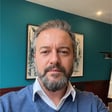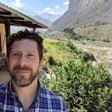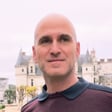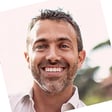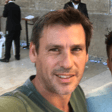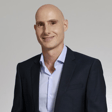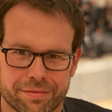Become a Creator today!Start creating today - Share your story with the world!
Start for free
00:00:00
00:00:01

Anu Babber
We talk about going from an agency in India, to distributing international TV content in the US to starting up a fashion brand in India. And, he offered to help get tickets to the 2026 world cup.
Recommended
Transcript
Introduction and Career Beginnings
00:00:01
joewaltman
All right, today we've got Anu Babur. Anu, thank you so much for joining.
00:00:06
Anu
Thank you, Joe. Really excited to be here.
00:00:08
joewaltman
All right, refresh our memory. What have you been, up or or what were you doing before you did NCIAD? And then what have you been up to for the last 20 years?
00:00:17
Anu
so So before NCIAD, I had and was working in India in the advertising and media industry. um So I spent about six odd years doing various things, including account planning, you know ad sales, business development, stuff like that.
00:00:40
Anu
And then um you know there was a moment
00:00:42
joewaltman
Would this have been like for an agency? for
00:00:45
Anu
Yeah, I started off working, my career started off with an Adagency, yes. So my first job was at low lint as, I don't know if you've heard of it, but low was one of the largest Adagencies in India. Prior to that, interestingly, I was an engineer, and but never got into in engineering as straight went from engineering college to an Adagency.
00:01:09
Anu
And then worked for Discovery Channel, actually launched the Discovery Channel in India, then launched the Master Geographic Channel in India. So that's
Choosing INSEAD and the Move to France
00:01:20
Anu
what I'd done prior to NCIAD. Then I decided I wanted to learn more.
00:01:29
Anu
take a break, go do an MBA. I was trying different US schools, um got into one or two of them. um I'm forgetting why I chose INSEAD at that stage, but yeah once I got into INSEAD, the decision was an easy one for me because you know the US schools were twice as expensive and twice as long.
00:01:59
Anu
as the NCI program um and so you know we just that was easy to choose.
00:02:04
joewaltman
what was the What was the reputation like in India for INSEAD kind of then versus now? I assume its it's got to become a little bit better known, right?
00:02:11
Anu
ah Definitely. you know At that time, I did not know anybody who had heard of NCIAD. It was only during the um the process that I got to meet a couple of NCIAD alums who interviewed me in India, but nobody, I knew nobody. Everyone I told that I was going to INSEAD had not heard of it.
00:02:38
Anu
So, you know, the brand recognition was...
00:02:40
joewaltman
The situation was about the same in California 20 years ago, just sitting here.
00:02:44
Anu
I'm sure, I'm sure. um and And I think it's very different now. In Seattle has really risen. The brand is quite visible. I think they've done a lot of great work in India.
00:02:56
Anu
I think the Allams who've come back to India have done phenomenally well and you know contributed to raising the equity for the brand. So so it's it's a different ballgame today.
00:03:06
joewaltman
Cool.
00:03:12
Anu
So yeah, so that's what, you know, just looking for a break
Extending Education and Career Shifts
00:03:16
Anu
from my working life. You know, I was married. I had a, I just had a kid. He was one year old when we decided to move to France. Actually, initially we were slotted to go to in Seattle in Singapore.
00:03:31
Anu
And just two weeks before our departure, we were told that yeah know we could choose Fontainebleau if we wanted to. So ah we had to change all our plans and prepare to go to France, which explained my very poor planning.
00:03:48
Anu
um you know, in terms of everything I encountered there, including the language, I had absolutely no clue.
00:03:52
joewaltman
Hehehe.
00:03:56
Anu
ah We just ended up packing our bags and landing up in France and winging it, you know, so that one year. It was an amazing year. I still look back, I think it was one of the best years of my life, great fond memories of it.
00:04:13
Anu
You know, we
00:04:13
joewaltman
but you're doing it with a partner and and a child, which is a very different kind of experience versus some of us who are who are who are sort of you know the...
00:04:17
Anu
Oh, yeah, absolutely. Absolutely. And so but we were all you know in it together. um and And during that one, actually,
00:04:28
Anu
My NCIAD experience extended even after NCIAD because um within that one year, first I chose to go and do one promote one quarter in Singapore. So we went there. And then I chose to also go to Wharton um at the end of the year. So ah we ended up, actually, instead of a 12-month program, it ended up being a 15-month program for us.
00:04:54
Anu
um And that was just because I wasn't getting much luck. You know, one of the reasons I went to NCIAD was to try and see if I could change careers, change industries, functions. But I wasn't having much luck at
Success at DirecTV and Industry Changes
00:05:11
Anu
NCIAD. You know, I was one of the, let's say, poets, like they call them in MBA schools.
00:05:18
Anu
um and So, you know, not one of the hottest commodities coming out. And then, you know, I thought I'll try my luck in US. I'd spent some time in US before. so So that's how I ended up going to Wharton. And, you know, it panned out well because um While I was there, News Corp came to the Wharton campus, and you know I ended up getting a job there. So that was the break I got right after NCIAD. So ah while I was looking to move away from media, I had to go back to media just for lack of options. News Corp had just acquired DirecTV, US's largest satellite TV operator.
00:06:08
Anu
And they were looking to set up an international um programming team there. so And I had all the relevant experience for that job. so So I jumped on. And you know and I so ended up staying with Direct TV for about eight years, <unk>re running the international programming team, and building, basically,
00:06:35
Anu
you know What we were doing was we were aggregating television content, basically TV channels from across the world and launching them into the US, given how large the immigrant populations are in the US from across the world.
00:06:52
Anu
So it was a fun job. I traveled around the world. We acquired almost 250 TV channels from, and I think, about 20 different languages, launched them in the US.
00:07:05
joewaltman
but When you say acquire, you mean actually acquiring them or or paying them some money so you could rebroadcast and in the US.
00:07:09
Anu
No, we licensed them. We licensed those TV channels.
00:07:13
joewaltman
Yeah.
00:07:13
Anu
i mean We didn't really acquire. In some cases, especially in sports, we did create, we acquired content, again licensed content, but we created a whole TV channel out of it.
00:07:29
Anu
so yeah One of my most favorite ah moments was when we acquired the or licensed the cricket rights for US for Indian Cricket Board. And in that year, I think it was 2007, we paid more to license those cricket rights for the US than the broadcaster who was so licensing the the ice hockey rights
00:08:03
Anu
and The NHL rights in the US had paid for them, so cricket was more expensive sport than ice hockey was. but anyway
00:08:12
Anu
um
00:08:12
joewaltman
And that is that is the right, i've I've often had this, this is going to get a little bit ah kind of teenage boy geeky here, but I've always often had this conversation that what is the best way to determine the size of a sport?
00:08:22
joewaltman
um and And I would contend it's it's how much the broadcasters are willing to pay for the TV rights to to to broadcast that sport. you know For example, the NFL in the United States is is bigger than all the other sports combined because the TV stations, that this is again getting getting way too American and way too kind of sporty for for this audience.
00:08:39
joewaltman
but
00:08:41
Anu
Yeah, so there is an element of truth to that. Of course, the audience, so what the audience is willing to pay for it. um I mean, those were great days for international content because, you know, the audience is, let's say you're a Chinese living in the US, you would pay a bomb to receive, you know, Mandarin content.
00:09:02
Anu
um You know, if you're an Indian,
00:09:02
joewaltman
Yeah.
00:09:04
joewaltman
This is like pre-streaming when it was a little bit tougher to get that stuff. you know
00:09:09
Anu
Yeah, so of course. um This is pre-streaming world completely. I was streaming changed the business totally. But yeah, so so those were very good days for the industry. Subscription revenues were crazy. People would pay an arm and a leg to get content in their language.
00:09:29
Anu
um great business to have. And Newscorp, given their whole international footprint, had a great strategic interest in building that business.
00:09:40
Anu
um
00:09:40
joewaltman
And I assume this is this was headquartered out of New York or or or were you living somewhere else?
00:09:43
Anu
So Direct TV was headquartered out of LA, but I was based out of New York. um The senior management was all in New York, but we would travel you know alternate weeks.
00:09:58
Anu
So the CEO had his private jet, and all of us would get hop onto it. um Monday morning, we would leave for LA. Friday evening, we'll come back to New York.
00:10:09
Anu
And that's what we did for six years.
00:10:09
joewaltman
oh that's pretty nice
00:10:12
Anu
Yeah, so so um it was a fun time.
00:10:13
joewaltman
wow
00:10:18
Anu
I had a lot of um not friends, made a lot of friends, traveled a lot, um built some exciting businesses.
00:10:30
Anu
um But then News Corp lost interest in in basically satellite TV.
00:10:33
joewaltman
Oh, that's pretty nice.
00:10:38
Anu
I think streaming had just started coming in at that time and News Corp saw the writing on the wall. So they spun direct TV off, sold off to a private equity group, actually to Liberty Media first and then spun off my private equity group and you know they started squeezing costs um so one of the first divisions that took a hit was our international programming division and um and so i I saw that as an
Entrepreneurship and New Ventures
00:11:06
Anu
opportunity to kind of do
00:11:09
Anu
I mean I've always wanted to have um do something on my own and so at that time I kind of jumped off, became a free agent. um I saw opportunity in migrating a lot of content from Direct TV because Direct TV was losing interest.
00:11:28
Anu
in that part of the business. So we migrated sort of the 250 networks that we had launched on direct.
00:11:30
joewaltman
Thank you.
00:11:35
Anu
I migrated almost 50, 60 of those over to Dish Network, which was the biggest competitor. And and so, you know, basically I was a middleman in those transactions.
00:11:48
Anu
I was just
00:11:49
joewaltman
Oh, so you weren't working for Dish, but you were sort of brokering those deals between. ah
00:11:53
Anu
Yeah, i was I started my own consulting business and I started helping these networks move over from direct to dish. um yeah There's a lot of friction in those kind of deals, and so I was just benefiting, collecting rent.
00:12:10
Anu
um It was um easy money, easy business for me.
00:12:11
joewaltman
Lovely.
00:12:16
Anu
I knew everyone, um and so you know for a while, while it lasted, it was very good. um But then, obviously, streaming had started coming in. Netflix and Prime had started building their international content slates. And slowly, that whole subscription business went to dogs. it ah and that That was one big learning. um you know Easy money doesn't last too long.
00:12:48
Anu
so So yeah, um oh you know, let's say, you know, I started off on my own in 2014, from 2014 till about 2000.
00:13:05
Anu
eighteen The going was good, but 2018 onwards. The business had started shrinking substantially. ah Subscription revenues. you know Customers who used to pay $100 a month would now pay $8 a month and get Netflix and be happy with it. So um so so yeah, the dynamics of the business changed completely. And and the writing on the wall was quite clear that the business was going down.
00:13:34
joewaltman
And what year would this have been when when it became just obvious that that there there there wasn't a...
00:13:34
Anu
ah
00:13:39
Anu
It just happened gradually. i mean it It had started happening even before that, which is why News Corp realized it way before anybody else. that they They actually sold that asset. It was a cash cow, but they sold it off because they saw that there was really no growth in the business anymore.
00:14:00
Anu
um So they they sold it in 2011 and then Liberty Media spun it off in 2013. um But basically, ah you know, the subscription revenue was just declining and very, it started out gradually but then quickly the graph was very steep.
00:14:21
joewaltman
Uh-huh.
00:14:22
Anu
um Customers were just so not willing to pay the kind of prices they were for content earlier. And there was no reason to. I mean, Netflix and Amazon did such a wonderful job aggregating all of that content. So so you know as as those businesses shrunk drastically, middlemen like me really yeah suffered. we because I would take a share of that revenue and that revenue just kept declining. So ah between 2012 and 2018, I think it was down to less than a quarter. Actually even less than that. 20% of what it was in 2012.
00:15:09
Anu
So it was very, very fast. So um then um I joined a friend of mine. He had started a sports betting. Actually, he had started a a prepaid card solution for streaming industry. ah Basically, you know, and especially specifically for sports. So, you know, we would tie up with NBA, NFL and MLB, and we would distribute their prepaid cards across retail. So you could walk into a Walmart, a 7-Eleven, a Costco, and pick up a NFL prepaid card off the shelf.
00:15:53
Anu
ah pay for it and now you have an activated streaming you know subscription so to say or so you know activation for the service so you could go you know you could buy a $25 card go out and watch $25 worth of and NBA games um
00:16:12
joewaltman
on On what kind of like your computer or in some set top box or
00:16:13
Anu
it
00:16:15
Anu
Yeah, on
Personal Changes and Building a Fashion Brand
00:16:16
Anu
on any device. So, you know, wherever you could access their apps.
00:16:16
joewaltman
okay.
00:16:21
joewaltman
Okay.
00:16:21
Anu
So you you just needed to download the NBA app on your mobile, on your even your computer. um And, you know, use this prepaid card to watch that content.
00:16:34
Anu
ah Now obviously, you know, it's very tricky, you know, you understand the sports rights issues. So, you know, it led to a lot of angst.
00:16:51
Anu
but within the distributors of sports content, especially ESPN. and um and And so we we were fighting a lot of those battles constantly. But anyway, the fact was we were distributing these cards across the retail landscape in the US.
00:17:09
Anu
and enabling people to a you know prepay and watch sports content. um but As part of that, we also distributed um an Indian OTT service called Hotstar, which Disney had acquired, and again, on the back of a lot of cricket content.
00:17:32
Anu
So, and that became our number one service because yeah it had the least amount of rights issues, um sort of say so So that was a good run, but again, um um ah you know in between actually I forgot to mention my wife Nelima she has always been in the fashion space and you know she's worked as a designer, as a stylist, as a merchandiser
00:18:05
Anu
um She has experience across production and distribution of fashion. kind of you know So she always wanted to start something on her own. So you know we started a small unit out of India. It was largely a hobby you know for her to try and see if clothes that she makes people are willing to buy or not.
00:18:30
Anu
and um And so, you know, then of course COVID hit um which changed a lot of things, including my relationship with my friend who was running this sports you know streaming prepaid solution startup. um And we kind of separated our ways. And you know our only son, um who was in college at that time, interestingly had gone, yeah know he was accepted at Duke. He chose to go to Duke in China. And so he was in Shanghai when COVID hit.
00:19:11
Anu
um
00:19:12
joewaltman
Oh.
00:19:14
Anu
and And then quickly, you know, Duke China shut down. He flew back. Then of course, all the US s schools shut down. um Anyway, he was home for a year and then went back to Duke in the US. So he graduated last year. um And the year before that, once he was back in college, me and my wife, we decided that we'll move back to India And you know I wanted to um you know have a second evening, so to say, to my career.
00:19:49
Anu
And this looked like an opportunity. so So that's what we did. We moved back to India. um We are trying to build this ah fashion brand um you know where we obviously are distributing the brand, but we're also manufacturing it.
00:20:10
Anu
We've decided consciously to be.
00:20:11
joewaltman
but So hold on, hold on. So you spent 20 years in the US being this media ah person.
00:20:14
Anu
Yeah.
00:20:18
joewaltman
And then about a year ago, you moved back to India. ah where i Two and a half years ago, where but I assume, excuse my ignorance, but I assume you you grew up, but you spent some time previously in India.
00:20:21
Anu
two two and a half years ago.
00:20:29
joewaltman
Yeah, you did you you before, before it's yet. um But you've had a 20 year gap. but what what's What's it like you know changing geographies and changing industries?
00:20:40
Anu
So ah so the the motivation was that ah The business that I had become familiar with in the US had declined to a point where I didn't see any future in it. ah um you know A relationship that I started with a friend of mine in the startup um had kind of petered out and so um that wasn't going anywhere and I needed
00:21:13
Anu
you know, basically to figure out what I wanted to do next. And my wife had started this business, so we decided, and during COVID, the business had started showing some traction, so we were excited about it. We wanted to see what we can do with it. Now, coming to India, um you know, it's a it's a big shift.
00:21:35
Anu
us I would say this, even though most of our European friends will not like it, but US is the best country in the world to live in. It's the most comfortable.
00:21:46
joewaltman
careful careful you can have some very angry Europeans careful
00:21:48
Anu
but Yeah, it is I've lived there for 20 years It's it's just the best place in the world to as an immigrant to living You know, I should qualify that so it's it's just so comfortable You know the opportunities the quality of life everything is just incredible ah but oh we have We had done that, you know we with with been through it, had an amazing run for 20 years. um And we wanted to try something different. And luckily, my wife went along with the idea. So and I proposed, why don't we move back to India? India, um again, joe it's obviously, we put ah all our baskets in the India, um you know all our eggs in the India basket.
00:22:42
Anu
But
Curvy's Mission and Community Engagement
00:22:43
Anu
to me, I think India is is that a great um you know place right now. and We can still screw it up, but I think if we
00:22:56
joewaltman
And where're where exactly in India are you? Is it near where you grew up? Give us sort of that. ah
00:23:02
Anu
yeah Yeah, so it's very close to where I grew up. my I lost my mom, but my dad lives about 100 miles from where I live. I'm um close to New Delhi, which is the capital. So it's north of India.
00:23:17
Anu
and um I'm in a town called Noida, which is just a suburb suburb of New Delhi. um And luckily, we you know both me and my wife, we have family, and we also have friends around here. um So it's a big shift. It's a big change. Our only son is in the US. Actually, he's in California, in the Bay Area. He graduated last year. He works for Amazon now.
00:23:47
Anu
um which makes it tough, especially on my wife.
00:23:47
joewaltman
Cool.
00:23:54
Anu
but But I must say, um I am enjoying it thoroughly. oh you know um It is financially draining the fact that we don't have a source of income right now, and we have been investing for the last three years in this business. We have completely bootstrapped this ourselves. oh So it is...
00:24:21
Anu
It is very high risk for us, but so enjoying the ride.
00:24:25
joewaltman
Mm-hmm.
00:24:30
joewaltman
Awesome. Awesome. i that's that's ah That's a great story. Thanks thanks so much for sharing. um um um I'm going to ask the the the final question in two parts. Is there anything we as the community can do to help you with with where you are, either personally or professionally, and vice versa? are there Is there anything think you you can you know offer to the community?
00:24:53
Anu
ah Yeah, great question. So so I'll just quickly you know, briefly tell you about what we are doing. So we run a women's fashion brand called Curvy, ah where we design and style clothes for, um you know, specifically for Curvy women bodies. And the two facts that differentiate us from any other brand, you know, we every style that we make comes in every size. ah And two,
00:25:26
Anu
you know um we've tried optimizing the entire manufacturing and supply chain oh for the government manufacturing process to try and see if we can do as much of our work on demand as possible. I mean one of the big problems with fast fashion is that you know there's too much junk that ends up creating a lot of ecological problems for the world. So we are trying to work on a inventory lean model anyway the fact is we we believe that this model can work we're working on it um successfully and now we want to scale it so we've done all the hard work the
00:26:15
Anu
The brand is, I mean, we're already distributing it in some pockets in the US. We're trying to get into Europe now. So anybody out there with an INSEAD who has relationships that we can tap into to help get our yeah know fashion brand either distributed or um you know get us to collaborate with anybody who would be like-minded would be great.
00:26:41
joewaltman
the This is a sensitive question, but I couldn't i can't help but ask. the The name of the company is Curvy. Are are you targeting certain, um shall we say,
00:26:54
joewaltman
categories of females?
00:26:57
Anu
Yeah, so, so ah you know, ah we are targeting what the industry calls plus size women. um But what we are doing is, you know, Curvy is a truly inclusive brand.
00:27:07
joewaltman
okay
00:27:13
Anu
Like I said, every style comes in every size. So one of the issues with most fashion brands is that they actually um create a large chunk of their catalog in very limited sizes. And a very small portion of that catalog is offered to women of larger sizes. Kirby is different from that. Our entire catalog is offered ah across the board.
00:27:36
Anu
um so So, yeah, while we are styling for curvy women bodies, but but we are an inclusive brand.
00:27:48
joewaltman
Well, one potential partnership just came to mind. you know We've got the ah the chocolate companies coming out of like France and Mexico with more alumni. and Maybe you could do a collab where where all the people eat their chocolate, get fat, and and and wear your clothes.
00:28:01
Anu
Well, the fact is,
00:28:01
joewaltman
Bad joke. Karyan, what can you do for for for us?
00:28:08
Anu
So I'll be happy to, look, my photos, you know, in terms of industry, it's been media, retail, a little bit of sports and now fashion. Anybody ah who needs any kind of help in those industries, specifically with respect to US or India, I'd be happy to help however I can.
00:28:32
Anu
um I have substantial relationships in these domains across the two regions. so so yeah happy I'll be happy to help, however I can, Joe.
00:28:41
joewaltman
i can you know what I can already think of there's ah there's a World Cup coming up in about two years here in the United States, and we're going to need tickets. So I'm sure people can call you up to score some tickets to to the key games there. So thanks for that offer. That's great.
00:28:57
Anu
Absolutely.
00:28:59
joewaltman
thank you Thank you. Hey, really, really good catching up. Thanks so much for your time. Good talking.
00:29:03
Anu
Thank you. Thank you, Joe. I appreciate what you're doing.
00:29:05
joewaltman
Ciao.
